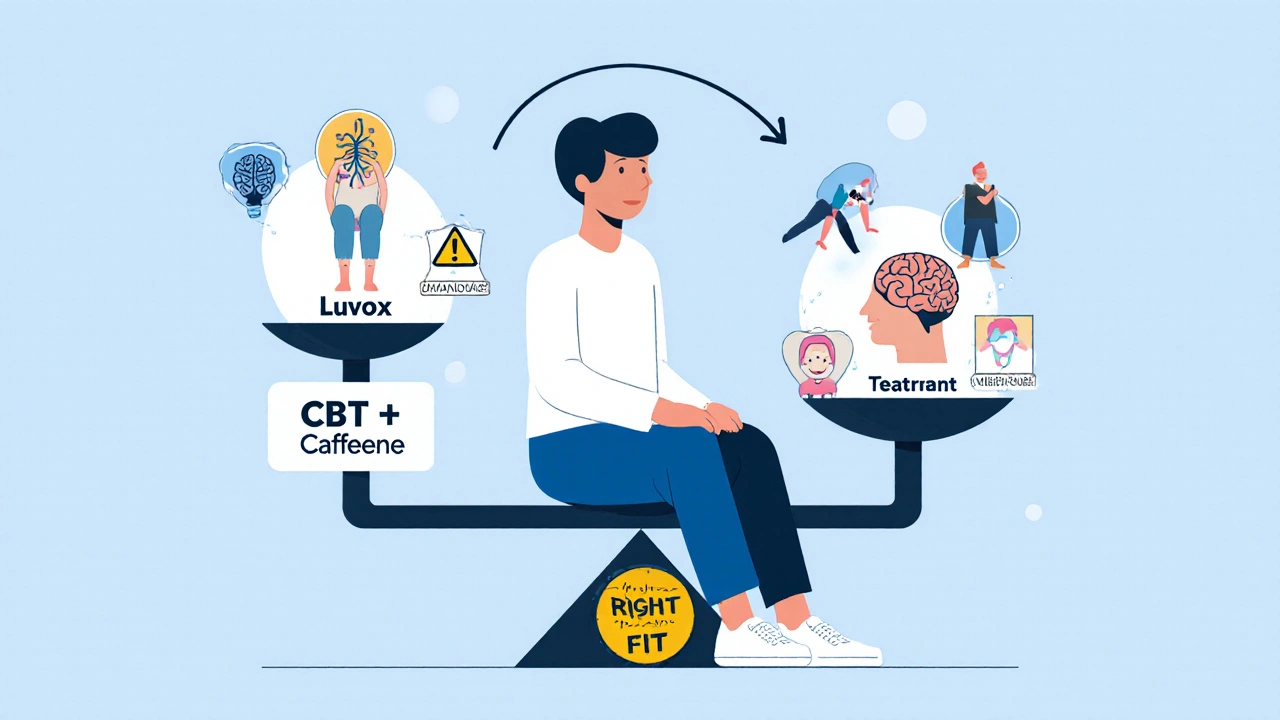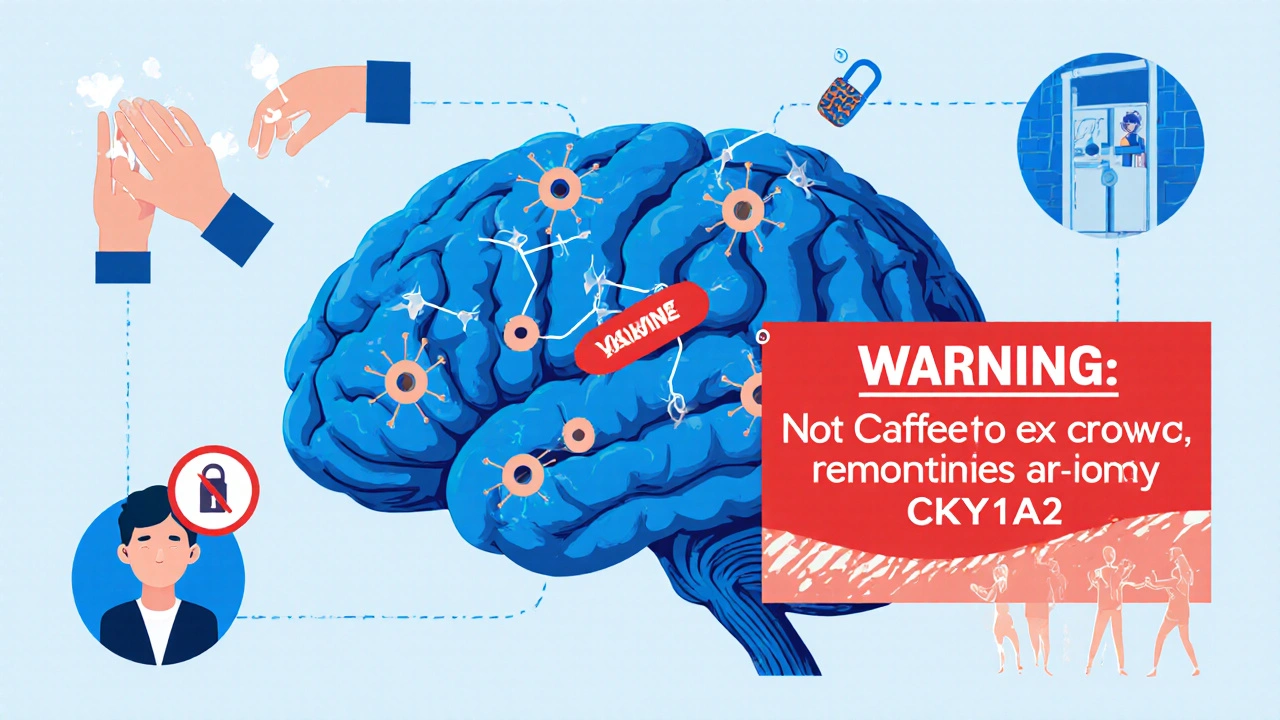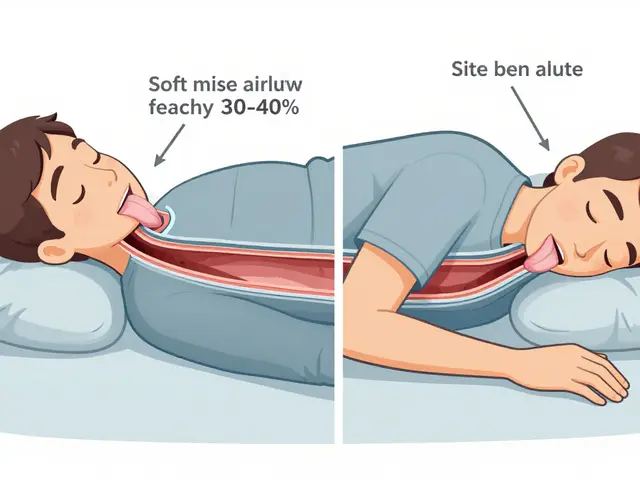Antidepressant Alternative Finder
Recommended Alternatives
| Medication | Best For | Key Considerations |
|---|---|---|
| Escitalopram (Lexapro) | Generalized Anxiety, Depression | Low drug interactions |
| Sertraline (Zoloft) | Depression, OCD, Panic Disorder | Well-tolerated |
| Venlafaxine (Effexor) | Severe Depression, Treatment-Resistant Anxiety | Monitor blood pressure |
When you're prescribed Luvox (fluvoxamine), it’s not because your doctor picked it at random. It’s because your symptoms-maybe intense obsessive thoughts, crippling social anxiety, or persistent panic attacks-didn’t respond to other options. But what if Luvox isn’t working? Or maybe it’s causing side effects that make you feel worse? That’s when you start asking: What are the alternatives?
What Luvox Actually Does
Luvox is an SSRI-selective serotonin reuptake inhibitor. It works by increasing serotonin levels in your brain. That’s the same basic mechanism as Prozac, Zoloft, and Lexapro. But Luvox has a unique profile. It’s especially effective for obsessive-compulsive disorder (OCD). In fact, it was one of the first SSRIs approved for OCD in the U.S. in 1994. It’s also used for social anxiety disorder and sometimes depression.
Unlike some SSRIs, Luvox has a shorter half-life. That means it leaves your system faster. For some people, this means quicker relief if side effects pop up. For others, it means more frequent dosing and potential withdrawal symptoms if you miss a pill. The standard starting dose is 50 mg per day, often increased slowly to 100-300 mg. It’s not a quick fix. It takes 4-8 weeks to show full effects.
Why People Look for Alternatives
People stop Luvox for three main reasons: side effects, lack of results, or drug interactions.
Common side effects include nausea, drowsiness, insomnia, and sexual dysfunction. But Luvox is also a strong inhibitor of the CYP1A2 liver enzyme. That means it can interfere with other medications-like caffeine, theophylline, clozapine, and even some blood thinners. If you’re on multiple meds, this can be a red flag.
Some patients report that Luvox makes them feel emotionally flat or overly sedated. Others find it doesn’t touch their anxiety at all. When that happens, switching to another SSRI or a different class of antidepressant becomes necessary.
Top Alternatives to Luvox
Here are the most commonly prescribed alternatives, broken down by effectiveness, side effects, and practical use.
1. Sertraline (Zoloft)
Sertraline is the most prescribed SSRI in the U.S. and one of the most studied for both depression and OCD. It’s often the first-line choice because it’s well-tolerated and has fewer drug interactions than Luvox.
It doesn’t inhibit CYP1A2 as strongly, so it’s safer if you’re taking other medications. Side effects are similar-nausea, headache, sexual issues-but often milder. Dosing starts at 25-50 mg daily, up to 200 mg. Many patients find sertraline easier to live with long-term.
2. Fluoxetine (Prozac)
Prozac has a very long half-life-up to 4-6 days. That means if you forget a dose, you’re less likely to feel withdrawal. It’s also effective for OCD and depression, with strong clinical backing.
But the long half-life can be a double-edged sword. If side effects occur, they stick around longer. Some people report increased anxiety at the start of treatment. It’s also not ideal if you’re planning to get pregnant soon, as it can linger in the body for weeks.
3. Escitalopram (Lexapro)
Lexapro is the S-enantiomer of citalopram, meaning it’s the more active part of the molecule. It’s often praised for being cleaner and more targeted. Studies show it may have slightly better efficacy for anxiety disorders than some other SSRIs.
Side effects are mild for most. Dosing is simple: 10-20 mg daily. It has minimal impact on liver enzymes, making it a safe choice for people on multiple medications. Many patients switch from Luvox to Lexapro because it feels more "balanced"-less sedating, fewer stomach issues.
4. Paroxetine (Paxil)
Paroxetine is another SSRI, but it’s known for being the most sedating and the most likely to cause weight gain. It’s also a strong inhibitor of CYP2D6, so it can interfere with beta-blockers, some pain meds, and even tamoxifen.
Despite that, it’s very effective for social anxiety disorder. Some patients who didn’t respond to Luvox find paroxetine finally helps them feel calm in social settings. But if you’re trying to avoid weight gain or drowsiness, this isn’t the best pick.
5. Venlafaxine (Effexor)
Venlafaxine is an SNRI-serotonin-norepinephrine reuptake inhibitor. That means it affects two neurotransmitters instead of just one. It’s often used when SSRIs fail.
Studies show venlafaxine can be more effective than SSRIs for severe depression and treatment-resistant anxiety. But it comes with a higher risk of elevated blood pressure and withdrawal symptoms if stopped abruptly. The immediate-release form requires multiple daily doses. The extended-release (XR) version is more convenient.
6. Clomipramine (Anafranil)
Clomipramine is a tricyclic antidepressant (TCA). It’s not an SSRI. But it’s one of the most effective drugs for OCD-often more so than SSRIs. It’s been used for decades and has a solid track record.
But it’s also older and has more side effects: dry mouth, constipation, blurred vision, dizziness, heart rhythm changes. It requires regular ECG monitoring. Most doctors won’t start with this unless SSRIs like Luvox have clearly failed.

Comparison Table: Luvox vs. Top Alternatives
| Medication | Class | Best For | Half-Life | Drug Interactions | Common Side Effects |
|---|---|---|---|---|---|
| Luvox (Fluvoxamine) | SSRI | OCD, social anxiety | Short (15 hours) | High (CYP1A2) | Nausea, drowsiness, insomnia, sexual dysfunction |
| Sertraline (Zoloft) | SSRI | Depression, OCD, panic disorder | Medium (26 hours) | Moderate | Nausea, headache, diarrhea, sexual issues |
| Fluoxetine (Prozac) | SSRI | Depression, OCD, bulimia | Very long (4-6 days) | Moderate (CYP2D6) | Initial anxiety, insomnia, weight loss |
| Escitalopram (Lexapro) | SSRI | Generalized anxiety, depression | Medium (27-32 hours) | Low | Nausea, fatigue, sexual dysfunction |
| Paroxetine (Paxil) | SSRI | Social anxiety, panic disorder | Short (21 hours) | High (CYP2D6) | Weight gain, drowsiness, dry mouth |
| Venlafaxine (Effexor) | SNRI | Severe depression, treatment-resistant anxiety | Short (5 hours, XR: 15 hours) | Moderate | Increased BP, sweating, nausea, withdrawal symptoms |
| Clomipramine (Anafranil) | TCA | Severe OCD | Long (20-30 hours) | High (CYP2D6, anticholinergic) | Dry mouth, constipation, dizziness, heart rhythm changes |
When to Switch from Luvox
You shouldn’t switch just because you feel a little worse in week two. Antidepressants take time. But here are clear signs it’s time to talk to your doctor:
- You’ve been on Luvox for 8 weeks at the maximum tolerated dose and see no improvement.
- You’re experiencing severe side effects-like suicidal thoughts, extreme agitation, or heart palpitations.
- You’re taking other medications that interact badly with Luvox (e.g., melatonin, caffeine pills, certain antibiotics).
- Your anxiety is getting worse, not better.
Never stop Luvox cold turkey. Tapering slowly over 2-4 weeks reduces the risk of withdrawal symptoms like dizziness, electric shock sensations, and rebound anxiety.

What About Non-Medication Options?
Medication isn’t the only path. For OCD and anxiety, cognitive behavioral therapy (CBT), especially exposure and response prevention (ERP), has been shown to be as effective as SSRIs-and more durable over time.
A 2023 meta-analysis in The Lancet Psychiatry found that CBT + medication worked better than medication alone for OCD. Many patients who switch from Luvox to CBT report feeling more in control, not just less anxious.
Exercise, sleep hygiene, and mindfulness practices also support recovery. They won’t replace medication for moderate to severe cases, but they make any treatment more effective.
Final Thoughts: It’s Not About the Best Drug-It’s About the Right Fit
There’s no single "best" antidepressant. What works for one person can fail for another-even with the same diagnosis. Luvox is powerful for OCD and social anxiety, but it’s not the easiest to live with.
For most people, sertraline or escitalopram are safer, gentler starting points. If those fail, venlafaxine or clomipramine might be next. And if medication alone isn’t enough, therapy should be part of the plan.
The goal isn’t to find the strongest drug. It’s to find the one that helps you feel like yourself again-without making you feel worse in the process.
Is Luvox stronger than Zoloft for anxiety?
Luvox and Zoloft (sertraline) are equally effective for anxiety disorders like OCD and social anxiety. But Zoloft is better tolerated and has fewer drug interactions. Most doctors start with Zoloft because it’s safer for long-term use. Luvox is often reserved for cases where other SSRIs haven’t worked.
Can I switch from Luvox to Lexapro safely?
Yes, switching from Luvox to Lexapro is common and usually safe. Because both are SSRIs, a direct switch is possible if you’re stable. But because Luvox has a short half-life, you may need to taper it down over 1-2 weeks before starting Lexapro to avoid withdrawal symptoms. Always do this under medical supervision.
Does fluvoxamine cause weight gain?
Fluvoxamine is less likely to cause weight gain than paroxetine or clomipramine. In fact, some people lose a small amount of weight early on due to reduced appetite or nausea. Long-term weight changes vary by individual, but overall, it’s considered neutral to mildly weight-neutral compared to other SSRIs.
What’s the fastest-acting SSRI for anxiety?
No SSRI works quickly-most take 4-8 weeks. But some people report feeling less anxious after 2-3 weeks on sertraline or escitalopram. Luvox can sometimes show effects slightly faster in OCD, but the difference is small. The key is consistency, not speed.
Can I take caffeine with Luvox?
No, it’s not safe. Luvox strongly blocks the enzyme that breaks down caffeine. This can cause caffeine to build up to dangerous levels-leading to jitteriness, rapid heartbeat, insomnia, or even seizures. Avoid coffee, energy drinks, and caffeine supplements while on Luvox.
Is there a natural alternative to Luvox?
There’s no natural supplement proven to be as effective as Luvox for clinical anxiety or OCD. St. John’s Wort has been studied for mild depression but interacts dangerously with SSRIs and isn’t reliable for OCD. Omega-3s, magnesium, and L-theanine may help with general calmness, but they’re supports-not replacements-for medication.







10 Comments
Amber O'Sullivan
Luvox made me feel like a zombie with a caffeine headache and zero motivation
Switched to sertraline and suddenly I could breathe again
No more 3am panic attacks or feeling like my brain was stuck in molasses
Also stopped drinking coffee and my heart stopped feeling like it was gonna explode
Doctors act like side effects are just "part of the process" but no they’re not
If your med makes you worse you’re not broken the drug is just wrong for you
Jim Oliver
Wow. Just… wow. You people are treating SSRIs like they’re interchangeable flavor-of-the-month ice cream. Luvox is a precision tool for OCD. It’s not supposed to be "easy". It’s supposed to work when everything else fails. You want gentle? Go take a bubble bath. You want results? Stop complaining and start respecting the pharmacology. Also, caffeine with Luvox? That’s not a side effect-that’s a suicide pact with your adrenal glands. You’re welcome.
William Priest
Lexapro is the GOAT. Like, no cap. Luvox? Too much work. Sertraline? Meh. But Lexapro? Clean. Smooth. Like a Tesla for your serotonin. I switched from Luvox after 6 months of feeling like my brain was full of wet cotton. Now I’m chill, focused, and actually enjoy my life again. Also, don’t even get me started on paroxetine. That stuff turns you into a sleepy potato. Just say no.
Ryan Masuga
Hey, I’ve been on Luvox for a year and honestly? It saved me. The nausea and insomnia sucked at first, but after 8 weeks, my OCD thoughts just… stopped. Like, they didn’t vanish, but they stopped owning me. I know switching is scary, but if you’re struggling, please talk to your doctor before quitting. And if you’re thinking about therapy? ERP changed my life. Medication gave me the space to heal, but therapy taught me how to live again. You’re not alone in this.
Jennifer Bedrosian
OMG I literally cried reading this because I’ve been on Luvox for 14 months and I thought I was the only one who felt like a ghost
My partner left me because I "wasn’t myself" and I was like… I’m not myself because this drug is eating my soul
Switched to Lexapro last month and now I’m laughing again
Also I quit coffee and my hands stopped shaking
Y’all need to know this isn’t just meds-it’s your whole life changing
Lashonda Rene
I just want to say that I think it’s so important to remember that everyone’s brain is different and what works for one person might not work for another and that’s okay
I tried Luvox because my doctor said it was good for social anxiety and I was so hopeful but then I got so tired all the time and I couldn’t even get out of bed and I felt like I was underwater
Then I tried sertraline and it was like someone turned on the lights in my head
And I know some people say SSRIs are just placebo but I swear to you I felt real change
And therapy helped too like so much
It’s not just about the pill it’s about the whole picture
And you deserve to feel better not just survive
Andy Slack
Clomipramine is the dark horse of OCD treatment
Yes it’s old
Yes it has side effects
But when SSRIs fail and you’re still trapped in your own mind
It’s the only thing that gives you back your life
I was on Luvox for 2 years
Then switched to clomipramine
Now I can touch doorknobs without washing my hands 17 times
It’s not perfect
But it’s worth it
Rashmi Mohapatra
Why are you all wasting time on SSRIs when you could just do yoga and eat turmeric
Medication is for weak people who don’t believe in the power of the mind
My cousin had OCD and she just meditated for 30 minutes a day and now she’s fine
Stop relying on chemicals and start relying on yourself
Also caffeine is poison anyway so why are you even drinking it
Abigail Chrisma
Thank you for writing this with so much care. I’m from a culture where mental health is still taboo, and seeing this level of detail helps me explain to my family what I’m going through.
Luvox was my last resort after three other SSRIs failed. I’m not cured, but I’m functional now.
And yes, therapy was the real game-changer. Medication gave me the stability. Therapy gave me the tools.
To anyone reading this who feels hopeless-you’re not broken. You’re just waiting for the right fit. Keep going.
Ankit Yadav
Just wanted to add something real quick
Luvox’s short half-life means you can’t just skip a dose and hope it’s fine
I tried once and spent 36 hours feeling like my head was being pulled apart by magnets
Don’t do that
And if you’re thinking about switching-do it slow
Even if your doctor says it’s "safe"-your brain remembers the rhythm
Trust me, I’ve been through it twice
Patience isn’t weakness. It’s survival.